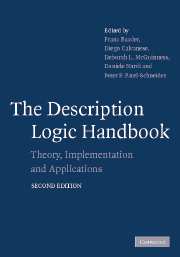Book contents
- Frontmatter
- Contents
- List of contributors
- Preface to the second edition
- Preface
- 1 An Introduction to Description Logics
- Part I Theory
- Part II Implementation
- 7 From Description Logic Provers to Knowledge Representation Systems
- 8 Description Logic Systems
- 9 Implementation and Optimization Techniques
- Part III Applications
- Appendix: Description Logic Terminology
- Bibliography
- Index
8 - Description Logic Systems
Published online by Cambridge University Press: 06 July 2010
- Frontmatter
- Contents
- List of contributors
- Preface to the second edition
- Preface
- 1 An Introduction to Description Logics
- Part I Theory
- Part II Implementation
- 7 From Description Logic Provers to Knowledge Representation Systems
- 8 Description Logic Systems
- 9 Implementation and Optimization Techniques
- Part III Applications
- Appendix: Description Logic Terminology
- Bibliography
- Index
Summary
Abstract
This chapter discusses implemented DL systems that have played or play an important role in the field. It first presents several earlier systems that, although not based on Description Logics, have provided important ideas. These systems include Kl-One, Krypton, Nikl, and Kandor. Then, successor systems are described by classifying them along the characteristics discussed in the previous chapters, addressing the following systems: Classic (“almost” complete, fast); Back, Loom (expressive, incomplete); Kris, Crack (expressive, complete). Finally, a new optimized generation of very expressive but sound and complete DL systems is also introduced. In particular, we focus on the systems Dlp, Fact, and Racer and explain what they can and cannot do.
New light through old windows?
In this chapter a description of the goals behind the development of different DL systems is given from a historical perspective. The description of DL systems allows important insights into the development of the knowledge representation research field as a whole. The design decisions behind the well-known systems which we discuss in this chapter not only reflect the trends in different knowledge representation research areas but also characterize the point of view on knowledge representation that different researchers advocate. The chapter discusses general capabilities of the systems and gives an analysis of the main language features and design decisions behind system architectures. The analysis of current systems in the light of a historical perspective might lead to new ideas for the development of even more powerful DL systems in the future.
- Type
- Chapter
- Information
- The Description Logic HandbookTheory, Implementation and Applications, pp. 304 - 328Publisher: Cambridge University PressPrint publication year: 2007
- 6
- Cited by



